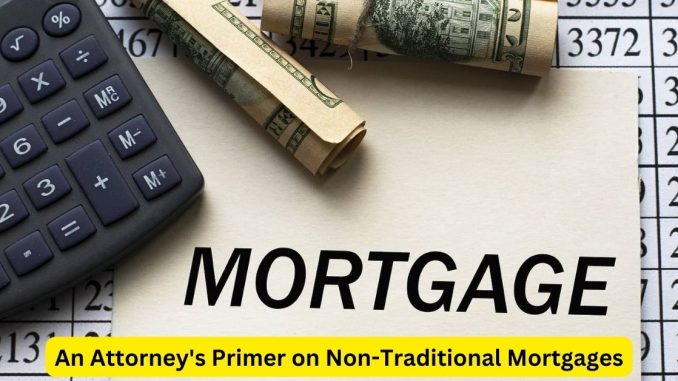
Non-traditional mortgages have emerged as alternatives to conventional home loans, offering flexibility and innovation in borrowing options. Attorneys navigating the complexities of these non-traditional mortgage products must understand their intricacies, legal implications, and considerations for both lenders and borrowers.
Non-traditional mortgages encompass a range of products, including interest-only mortgages, adjustable-rate mortgages (ARMs), balloon mortgages, and hybrid loans. These unconventional structures often deviate from standard fixed-rate loans, presenting unique legal considerations.
One crucial aspect attorneys must address is client education and disclosure. It’s imperative for attorneys to ensure that borrowers fully comprehend the terms, risks, and potential fluctuations in payments associated with non-traditional mortgages. Meeting disclosure requirements and explaining the implications of these mortgages are pivotal in avoiding misunderstandings and potential legal disputes.
Legal professionals play a critical role in evaluating the suitability of non-traditional mortgages for their clients. Assessing the borrower’s financial situation, risk tolerance, and long-term goals is essential in recommending the most suitable mortgage product. Attorneys can provide guidance on whether these innovative mortgage structures align with their client’s needs and financial capabilities.
Regulatory compliance is another significant consideration. Attorneys must ensure that non-traditional mortgage products comply with federal and state regulations, including consumer protection laws, fair lending practices, and disclosure requirements mandated by the Truth in Lending Act (TILA). Staying updated on regulatory changes is crucial for legal professionals navigating this dynamic landscape.
Due diligence is paramount when dealing with non-traditional mortgages. Attorneys should scrutinize loan documents, assess the accuracy of disclosures, and verify compliance with legal requirements. Thoroughly reviewing the terms, potential rate adjustments, payment structures, and associated risks is crucial to protect the interests of borrowers.
Mitigating risks associated with non-traditional mortgages involves understanding potential pitfalls. Attorneys should advise clients on potential scenarios, such as payment shock with ARMs or balloon payments, and outline strategies to manage these risks effectively. Legal professionals play a crucial role in helping borrowers make informed decisions and mitigating potential legal challenges.
Additionally, attorneys can assist lenders in structuring non-traditional mortgage products within legal boundaries. Providing guidance on compliance, drafting contracts, and ensuring that lending practices adhere to regulatory standards helps lenders navigate the legal complexities associated with offering innovative mortgage products.
In conclusion, non-traditional mortgages offer innovation and flexibility but come with legal intricacies that require careful consideration. Attorneys serve a pivotal role in guiding both borrowers and lenders through the complexities of these mortgage structures. By offering informed advice, ensuring compliance, and prioritizing client understanding, legal professionals contribute to fostering responsible use and offering or managing non-traditional mortgage products in a legally sound manner.
Leave a Reply